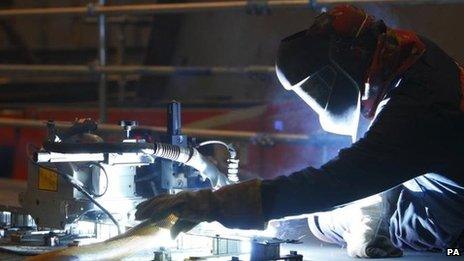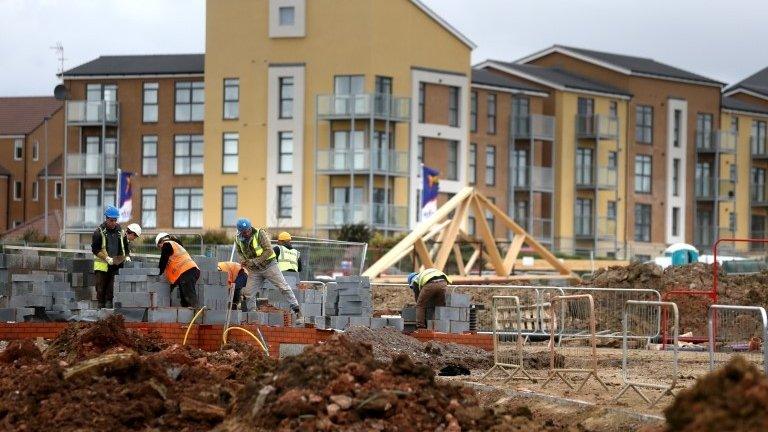UK economic growth boosted by business investment
- Published

UK economic growth in the first quarter was helped by the fastest expansion in business investment in two years, official figures have shown.
Business investment grew by 5% in the first three months of this year, almost double an earlier estimate of 2.7%.
But the Office of National Statistics kept its estimate for economic growth in the quarter unchanged at 0.8%.
Business investment is one of the factors used to assess the amount of "spare capacity" in the economy.
In February the Bank of England estimated there was between 1% and 1.5% of spare capacity in the economy.
Spare capacity most often stems from underinvestment by businesses. It is the Bank of England's way of gauging how far GDP is below its potential growth, and is also used by the Bank as one way of assessing when to raise interest rates.
The ONS said business investment contributed 0.4% of the 0.8% of growth in the economy in the first three months of 2014.
The annual growth rate for the UK economy was revised down slightly to 3% from 3.1%. But despite the slight downward revision this was still the strongest since 2007.
Separately, the ONS said the UK's dominant services sector grew by 0.3% in April following a rise of 0.5% in March.
Accelerating
Most economists had expected the quarterly figure to remain unchanged, although some forecast a small rise to 0.9% after a second estimate of growth in the construction sector showed it expanded by 1.5% compared with an original 0.6% estimate.
The UK economy remained 0.6% smaller than before the start of the financial crisis in the first quarter of 2014, but looks set to surpass its pre-crisis peak in the current quarter.
Recent data and surveys point to a further strengthening of growth in the second quarter, with the Bank of England forecasting a 3.4% growth this year.
Bank governor Mark Carney said the economy was showing more momentum than the central bank had expected, and raised the possibility of an interest rate later this year if wage growth picks up and growth does not slow down.
Mr Carney told BBC Radio 4's Today programme the timing of any interest rate rise was less important than where they settled in the medium term. He suggested that level the "new normal" for rates would be about 2.5% by the beginning of 2017.
Howard Archer, chief UK and European economist at IHS Global Insight said: "The best news in the GDP data was the marked upward revision to business investment.
"This not only indicates that growth is becoming less centred on consumer spending but could also have positive implications for future productivity growth."
David Tinsley, UK economist at BNP Paribas, said the figures held few surprises, but added the increase in business investment suggested the UK recovery was "looking increasingly broadly balanced".
- Published13 June 2014

- Published29 April 2014
